My girls have been enjoying time with cousins from both sides of the family. Some are more distant cousins than others but it’s generally easier just to refer to them all as just “cousin” rather than be more specific. Cousin relationships often seem quite confusing and thanks to my interest in genealogy, I’m often the person in my family who gets asked to clarify what the specific relationship is. Working out the degree of cousinship though is actually fairly straightforward so if you’re someone who gets confused by it, read on and hopefully all will be made clear.
1) First of all, you need to work out who your shared ancestor is. For example in Figure 1 below, Susan and George share the same grandparents – Edith and John.
2) The degree of cousinship is the same as the number of “G’s” in the closest shared ancestor. As Susan and George share Grandparents, they are first cousins.
3) In Figure 2, Edith and John are the Great-Grandparents of Paula and Karen. 2 G’s so they are second cousins.
4) First, second, third etc. cousins are on the same generational line as each other. “Degrees removed” comes into play with the two cousins are on different generational lines, for example in Figure 3.
The common ancestors for Anne and Karen are Edith and John who are Anne’s Grandparents and Karen’s Great-Grandparents. The closest link is from Anne with one G – so they are first cousins but once removed as Anne and Karen are one generational line apart.
In Figure 4, Edith and John are Anne’s Grandparents and Hannah’s Great-Great-Grandparents. The closest link is from Anne – one G again and the two cousins are two generational lines apart so they are first cousins twice removed.
One more example to help clarify is shown in Figure 5. Again Edith and John are the shared ancestors – they are Paula’s Great-Grandparents and Hannah’s Great-Great-Grandparents. The closest link is from Paula – two G’s and the two cousins are one generational line apart. They are therefore second cousins once removed.
If you’re getting confused by the above, the table below also gives a guide to working out cousin relationships which may also help to clarify these.
5) You can also get what are known as ‘double cousins’ – this is when the cousins share two sets of common ancestors due to two sets of siblings marrying. Figure 6 shows an example of this. David and Mary are siblings, as are Robert and Fiona. Susan and George therefore share two sets of grandparents – Edith and John and Alice and William which makes them double cousins.
There are double cousins in hubby’s family – my father-in-law has three double cousins as their parents were two sets of siblings.
Of course, it is often easier just to refer to ‘distant cousins’ but if you ever want to work out more specifically what the cousin relationship is, hopefully this guide has helped you to do so.


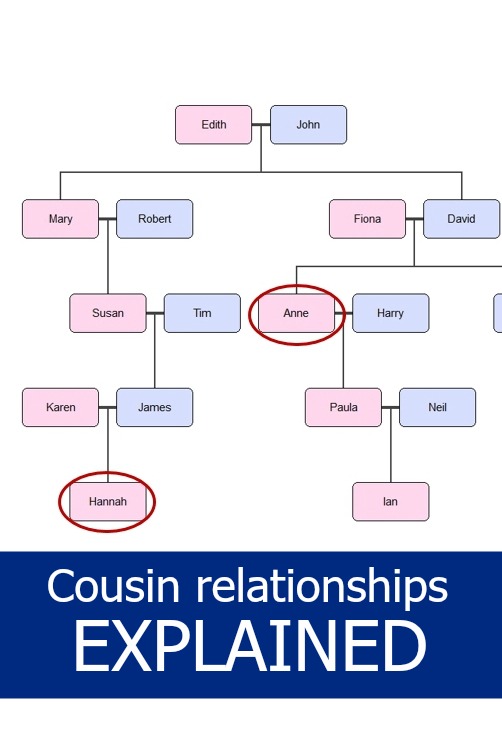
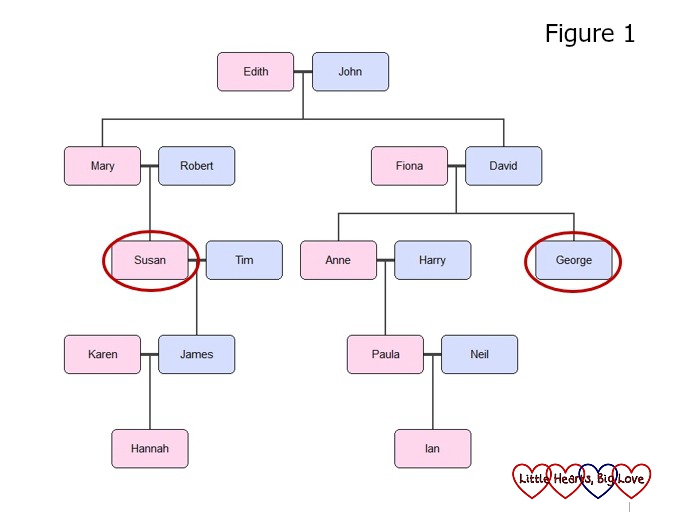
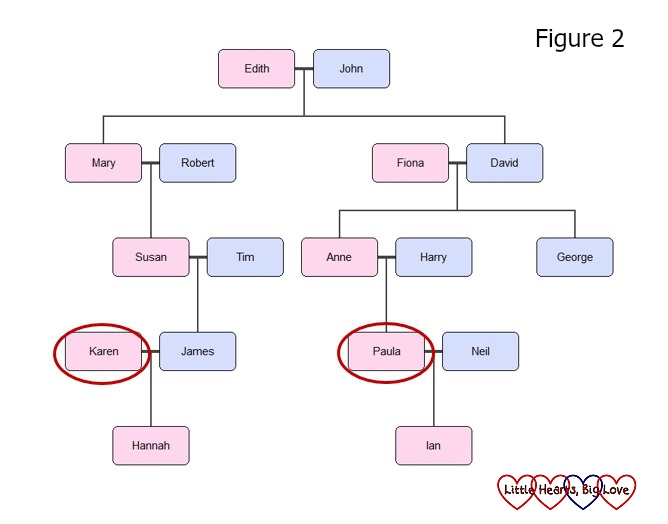
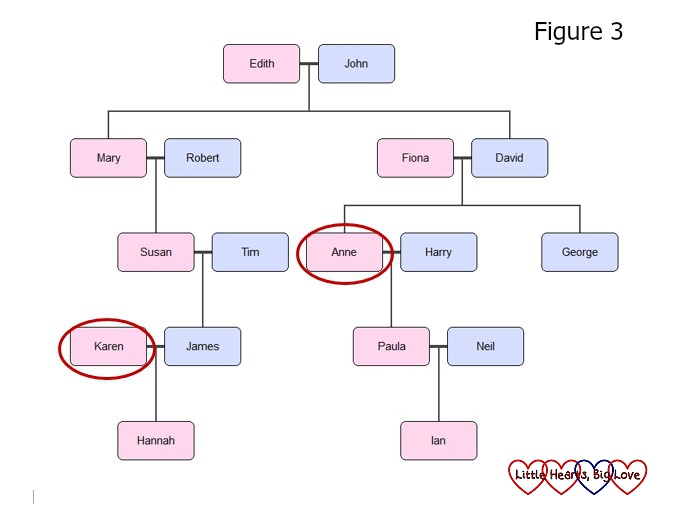
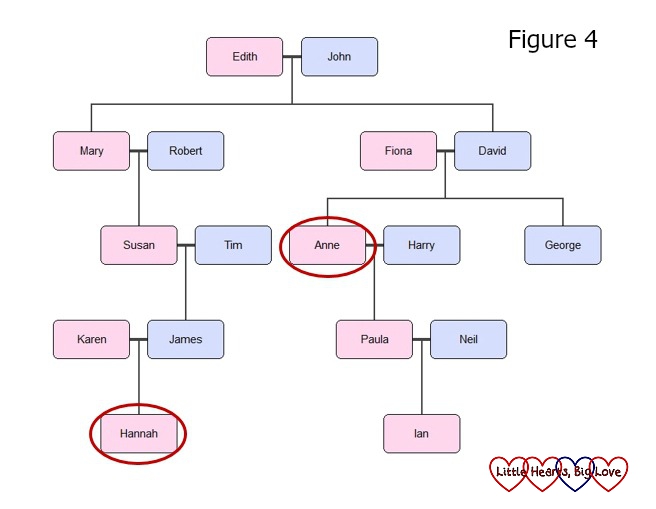
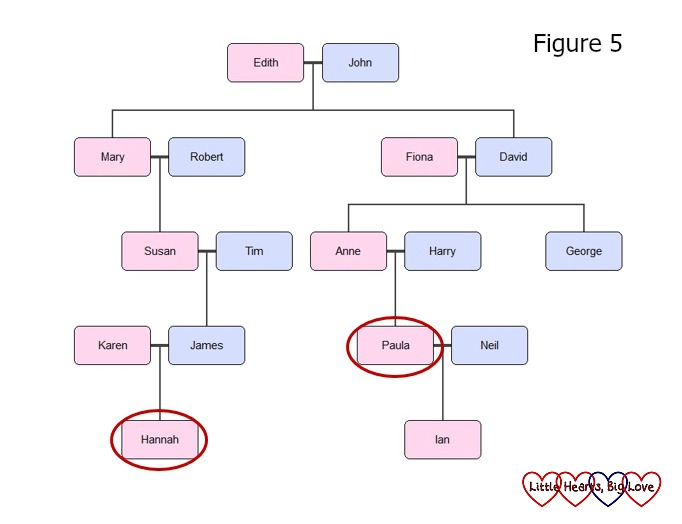

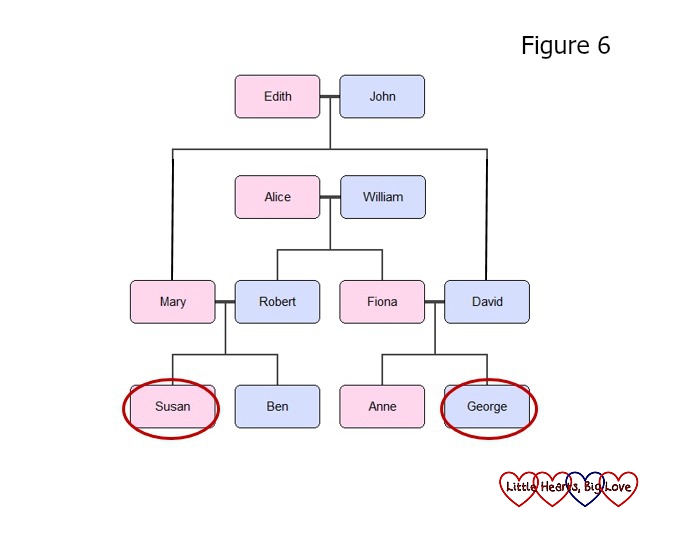



I did not even know that there were so many official cousin terms. Like many I just get confused and say ‘Some kind of cousin’ to explain. So now I know that two of my ‘cousins’ are actually 1st cousins once removed. Cool. Thanks
Glad it has helped clarify things 🙂
I have always wondered about this!! What a helpful post, though I’ll have to keep referring back, not sure I can remember all my G’s! x #sharewithme
Thanks Jess, glad you found it helpful 🙂
Doubkle cousins! Mind blown! I was discussing with someone recently that cousins are the best because there isn’t a massive pressure to hang out with them unless you like them so they’re just friends that ‘get’ your kooky family.
Oh I love that way of describing cousins – so true!
I had no idea it was all so complicated we have always just said cousins! But now I know =) Really informative post, thanks for taking the time to share it =)
Thanks Jenni – so glad you found it useful 🙂
I came from the Philippines and I came from a big family. 9 aunts and uncle on each side and so many cousins! And thats just from my immediate family! I know my cousins till the 9th degree!
This is an amazing post! So in-depth. =) #sharewithme
Thank you Merlinda – having lots of cousins can make working out the exact relationship tricky although it can also help make you aware of the different cousin relationships too 🙂
I love family trees and seeing how everyone is related. This is brilliant. Thank you so much for linking up to Share With Me. #sharewithme
Thank you Jenny, lovely to link up again 🙂
Blimey… still a bit confused by the double cousin thing but the rest makes a lot more sense to me now!
#TheList
Double cousins are very confusing – I think I’d struggle with that too if it wasn’t for the fact that there are some in hubby’s family. Glad the rest made sense!
I never understood this. Thanks for clarifying.
Glad it helped 🙂
Very well explained, I had just about managed to sort the difference between first/second and first/first once removed etc in my head, but this makes it easier!
Thank you Sara – glad it made it clear 🙂
This is a really informative post! Thanks for sharing! I’m off to show my mummy the diagrams! #TheList
Glad you found it helpful and hope your mummy does too! 🙂
Oh I didn’t know any of this, thank you!x
Glad you found it helpful, Laura 🙂
Oh my goodness! This is so helpful. Thanks Louise! Has clarified a few things for me. Good knowledge/research presented in a really clear way. #pocolo
Thank you – so glad that it clarified things for you 🙂
This is brilliant! You took something extremely complicated and made it easy to understand, particularly the rule of “g”
Debbie
http://www.myrandommusings.blogspot.com
Thank you Debbie – so glad that it was easy to understand.
Gosh I didn’t even know there were so many! Thank you for sharing such an informative post in a simple to understand format.
Joining you from #PoCoLo
So glad you found it easy to understand 🙂
Hi Louise, you explain the differences in cousins wonderfully, I really had no idea before now what cousins once/twice removed were. I’m sure the children will find this interesting too as here in Greece everyone is everyone else s cousin and it gets very confusing.
Think I’ll be bookmarking this post for future reference. I’m sure I have friends here who will find it interesting to know exactly how their husbands are cousins to everyone down the street!
Thank you Debbie – so glad that you found it helpful and that it helped clarify things 🙂
This is really interesting – and seems quite complex to me! I always knew about second cousins but that was about it. Very informative post. Great to see you today – sorry we didn’t chat longer. Thank you for linking to #PoCoLo x
Thank you Vic – glad you found it informative. Was lovely to meet you at BlogCamp and always a pleasure to link up to #PoCoLo 🙂
THANK YOU for clearing something up that has been the topic of much debate in our house! I have quite a sprawling family and when my son was born we had many family visit where we spent most of the time trying to figure out quite how they were related! Very useful indeed 🙂 #pocolo
So glad that you found it helpful and it has helped clarify how people in your family are related 🙂
My eldest had family relationships (like this) completely figured out by 5, and could tell you who was what in seconds, it always amazed me 🙂
Wow that is very impressive – it took me a while longer to figure them out! 🙂
What a great post, so informative! Thanks so much for linking up to #TheList x
Thanks Aby, always a pleasure to link up 🙂
Wow! You do have an interest in genealogy 🙂 This is very handy, as my husband is Irish and there’s lots of cousins around, with different relationship degree.
#TheList
Thank you, so glad you found it helpful 🙂